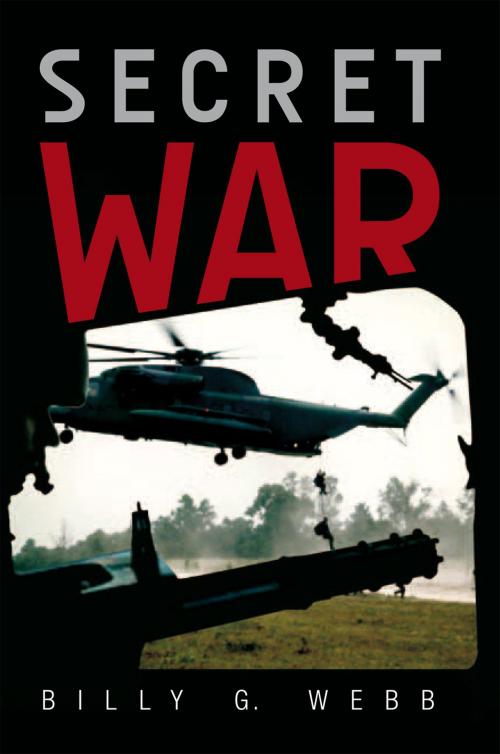| Author: | Billy G. Webb | ISBN: | 9781453564868 |
| Publisher: | Xlibris US | Publication: | September 13, 2010 |
| Imprint: | Xlibris US | Language: | English |
| Author: | Billy G. Webb |
| ISBN: | 9781453564868 |
| Publisher: | Xlibris US |
| Publication: | September 13, 2010 |
| Imprint: | Xlibris US |
| Language: | English |
If war really is an extension of politics by other means, as Carl von Clausewitz declared back in 1827, then few wars have served as better examples than the Secret War in Laos from 1961-1975. A clandestine conflict fought in parallel with the Vietnam War, the Laotian Secret War ostensibly set the United States, Thailand, and various Laotian factions against Ho Chi Minh's North Vietnamese Army (NVA). In practice, the conflict was as much a civil war as an invasion; and ultimately, it devolved into a slow-motion act of suicide on the part of the Lao nation itself. The U.S. military and its Laotian Hmong allies, led by the resourceful General Vang Pao, made a disciplined effort to prosecute the warthough from beginning to end, that effort was steeped in self-serving politics, and hamstrung by factional infighting, irrational decision-making, and self-imposed constraints that ultimately hurt more than they helped. Micromanagement by officers and clueless politicians far from the front was bad enough; far worse was the corruption of the head-butting Lao factions, who seemed unable to see beyond their own immediate needs and certainly had no vision for a strong, united Laos. The so-called Rightists, Leftists, and Neutralist factions simply could not wrap their heads around the concept that their only hope of survival lay in coming together against the relentless, well-equipped NVA. In fact, one faction, the Pathet Lao, repeatedly allied with the NVA against their own countrymen. But the Americans and Vang Pao's Hmong, those who repeatedly found themselves on the sharp end of the spear in the face of waffling, lack of discipline, and, occasionally, sheer cowardice on the part of their allies, refused to give upuntil, finally, their political leadership turned their backs on them. This is the story of those brave men, and the civilians who helped them fight an increasingly painful and mismanaged war. It was a war in which the political leaders involved proved conclusively that they had learned nothing from historyor simply didn't care. Through ineptitude and back-room politicking, the leadership of both Laos and the United States eventually gave Laos to the Communistswho proceeded to crush the Lao people into the dust, in the name of a morally bankrupt ideology that they themselves neither practiced nor truly believed in. Billy G. Webb lays out their story with both great precision and compassion in this lively, well-researched book, outlining the events that led us into the morass of the Secret War, and then detailing each bloody campaign of each bloody year. In addition to following the key characters on the U.S./Laotian side, especially the charismatic Vang Pao, he peppers the story with tales of courageous individuals who fell victim to the NVA and the Pathet Laoand, occasionally, the stupidity, incompetence, and gutlessness of people they trusted. Some survived to fight again; but many of these men, military and otherwise, paid the ultimate sacrifice in their fight to keep Laos free. Webb takes special care to showcase two organizations: the brave Forward Air Controllers who called themselves "the Ravens," and Air America, a civilian company (run by the CIA) that supported the military effort and aided the Lao populace whenever they were called upon. Few people have ever heard of the Ravens, those USAF and Army airmen who risked life and limb in tiny Cessna aircraft to locate targets for bombers and fighters to strike. Air America is more famous, due to the 1990 movie of the same namea film that unfairly maligned Air America as a parcel service for Laotian powerbrokers moving drugs and gold out of the country. Webb sets the record emphatically straight. That's not to say that such things weren't happening in Laos; they were. In hindsight, it's easy to condemn the CIA and the U.S. military leadership for allowing the corruption to spread; but as Nietzsche has pointed out, when you look long in
If war really is an extension of politics by other means, as Carl von Clausewitz declared back in 1827, then few wars have served as better examples than the Secret War in Laos from 1961-1975. A clandestine conflict fought in parallel with the Vietnam War, the Laotian Secret War ostensibly set the United States, Thailand, and various Laotian factions against Ho Chi Minh's North Vietnamese Army (NVA). In practice, the conflict was as much a civil war as an invasion; and ultimately, it devolved into a slow-motion act of suicide on the part of the Lao nation itself. The U.S. military and its Laotian Hmong allies, led by the resourceful General Vang Pao, made a disciplined effort to prosecute the warthough from beginning to end, that effort was steeped in self-serving politics, and hamstrung by factional infighting, irrational decision-making, and self-imposed constraints that ultimately hurt more than they helped. Micromanagement by officers and clueless politicians far from the front was bad enough; far worse was the corruption of the head-butting Lao factions, who seemed unable to see beyond their own immediate needs and certainly had no vision for a strong, united Laos. The so-called Rightists, Leftists, and Neutralist factions simply could not wrap their heads around the concept that their only hope of survival lay in coming together against the relentless, well-equipped NVA. In fact, one faction, the Pathet Lao, repeatedly allied with the NVA against their own countrymen. But the Americans and Vang Pao's Hmong, those who repeatedly found themselves on the sharp end of the spear in the face of waffling, lack of discipline, and, occasionally, sheer cowardice on the part of their allies, refused to give upuntil, finally, their political leadership turned their backs on them. This is the story of those brave men, and the civilians who helped them fight an increasingly painful and mismanaged war. It was a war in which the political leaders involved proved conclusively that they had learned nothing from historyor simply didn't care. Through ineptitude and back-room politicking, the leadership of both Laos and the United States eventually gave Laos to the Communistswho proceeded to crush the Lao people into the dust, in the name of a morally bankrupt ideology that they themselves neither practiced nor truly believed in. Billy G. Webb lays out their story with both great precision and compassion in this lively, well-researched book, outlining the events that led us into the morass of the Secret War, and then detailing each bloody campaign of each bloody year. In addition to following the key characters on the U.S./Laotian side, especially the charismatic Vang Pao, he peppers the story with tales of courageous individuals who fell victim to the NVA and the Pathet Laoand, occasionally, the stupidity, incompetence, and gutlessness of people they trusted. Some survived to fight again; but many of these men, military and otherwise, paid the ultimate sacrifice in their fight to keep Laos free. Webb takes special care to showcase two organizations: the brave Forward Air Controllers who called themselves "the Ravens," and Air America, a civilian company (run by the CIA) that supported the military effort and aided the Lao populace whenever they were called upon. Few people have ever heard of the Ravens, those USAF and Army airmen who risked life and limb in tiny Cessna aircraft to locate targets for bombers and fighters to strike. Air America is more famous, due to the 1990 movie of the same namea film that unfairly maligned Air America as a parcel service for Laotian powerbrokers moving drugs and gold out of the country. Webb sets the record emphatically straight. That's not to say that such things weren't happening in Laos; they were. In hindsight, it's easy to condemn the CIA and the U.S. military leadership for allowing the corruption to spread; but as Nietzsche has pointed out, when you look long in















